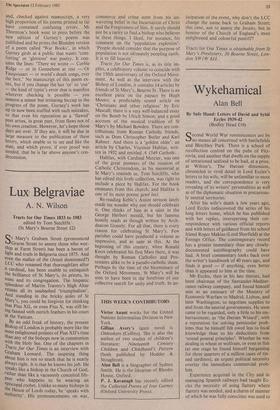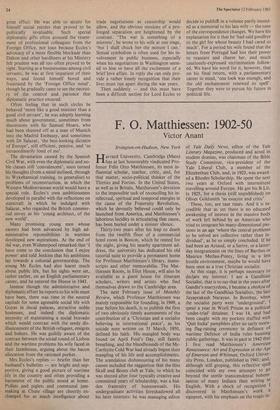Wykehamical
Alan Bell By Safe Hand: Letters of David and Sybil Eccles 1939-42 (Bodley Head £16) Second World War reminiscences are by no means all concerned with battlefields and Bletchley Park. There is a school of recollection centred on the pubs of Fitz- rovia, and another that dwells on the supply of unrationed seafood to be had, at a price, at Wilton's. The Iberian dimension, chronicled in vivid detail in Lord Eccles's letters to his wife, will be unfamiliar to most readers, and the correspondence is very revealing of its writers' personalities as well as of the diplomatic situation in precarious- ly neutral territories.
After his wife's death a few years ago, Lord Eccles rediscovered the series of his long letters home, which he has published with her replies, interspersing their cor- respondence with various official reports and with letters of guidance from his school friend Roger Makins (Lord Sherfield) at the Foreign Office. The contemporary record has a greater immediacy than any closely- documented autobiography could have had. A brief commentary looks back over the writer's handiwork of 40 years ago, and finds it good — if anything, even better than it appeared to him at the time.
Mr Eccles, then in his late thirties, had been chairman of the Santander-Mediter- raneo railway company, and found himself sent as an emissary of the Ministry of Economic Warfare to Madrid, Lisbon, and later Washington, to negotiate supplies to and from the neutral governments. He soon came to be regarded, only a little to his em- barrassment, as `the Iberian Wizard', with a reputation for solving peninsular prob- lems that he himself felt owed less to local knowledge than to his deductions from `sound general principles'. Whether he was dealing in wheat or wolfram, or even in fish (at one stage he found himself bargaining for three quarters of a million cases of tin- ned sardines), an urgent political necessity overlay the immediate commercial prob- lem.
Experience acquired in the City and in managing Spanish railways had taught Ec- cles the necessity of using flattery where flattery was needed, and a charm of manner of which he was fully conscious was used to great effect. He was able to secure for himself social entrees that proved to be politically invaluable. Such special diplomatic gifts often aroused the resent- ment of professional colleagues from the Foreign Office, not least because Eccles's advocacy of a more flexible blockade than Dalton and other hardliners at his Ministry felt prudent was all too often proved to be right. Starting as a businessman among civil servants, he was at first impatient of their ways, and found himself bored and frustrated by the 'Foreign Office mind', though he gradually came to see the necessi- ty of the control and patience that diplomatic practice ensured.
Often feeling that in such circles he behaved 'more like a good minister than a good civil servant', he was adeptly learning much about government, sometimes from discussions with Sir Samuel Hoare, who had been shunted off as a man of Munich into the Madrid Embassy, and sometimes with Dr Salazar, 'the best-looking dictator of Europe', still efficient, pensive, and `so extraordinarily fond of me'.
The devastation caused by the Spanish Civil War, with even the diplomatic and no- ble classes still 'convalescent', soon turned his thoughts (from a mind inclined, through its Wykehamical training, to generalise) to problems of reconstruction, in which the Western Mediterranean world would have a special role. Eccles's own ambitiousness developed in parallel with the reflections on statecraft in which he indulged with Salazar, who regarded the British commer- cial envoy as his 'young architect, of the new world'.
Many promising young men whose careers had been advanced by high ad- ministrative reponsibilities in wartime developed new aspirations. At the end of the war, even Widmerpool remarked that 'I have come to the conclusion that I enjoy power' and told Jenkins that his ambitions lay towards a colonial governorship. The young Mr Eccles had also learnt much about public life, but his sights were set, rather earlier, on an English parliamentary career, and he entered the House in 1943.
Intense though the administrative and diplomatic effort he reports to his wife must have been, there was time in the neutral capitals for some agreeable social life with Goyas in ducal palaces, attractive noble hostesses, and indeed the diplomatic necessity of maintaining a social bravado which would contrast with the seedy dis- illusionment of the British refugees, emigres and bolters. He was guiltily aware of the contrast between the social round of Lisbon and the wartime problems his wife faced in their farmhouse, arguing about the bacon allocation from the rationed porker.
Mrs Eccles's replies — briefer than her husband's bulletins — are bright and sup- portive, giving a good picture of wartime life in the country and often providing a barometer of the public mood at home. Pullets and piglets and communal jam- making at Chute village are cheerily ex- changed for as much intelligence about trade negotiations as censorship would allow, and the obvious tensions of a pro- longed separation are heightened by the contrast. 'The war is something of a mistress', he wrote to his wife at one stage, 'but I shall chuck her the minute I can.' Sexual symbolism is often used for his in- volvement in public business, especially when his negotiations in Washington seem- ed to him to have all the excitement of a brief love affair. In reply she can only pro- vide a rather lonely recognition that their lives must run apart during the war years.
Then suddenly — and this must have been a difficult section for Lord Eccles to decide to publish in a volume partly intend- ed as a memorial to his late wife — the tone of the correspondence changes. We have his explanation for it that he 'had said goodbye to the girl for whose beauty I had cared so much'. For a period his wife found that the letters from Portugal had lost their power to reassure and charm her, and much cautiously-expressed recrimination follow- ed. We have his word for it, however, that on his final return, with a parliamentary career in mind, 'one look was enough, and the old enchantment renewed its spell'. Together they were to pursue his future in political life.







































 Previous page
Previous page